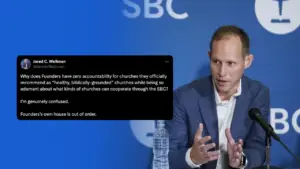Competing visions for the future of the Southern Baptist Convention are coming to a showdown. While I do not pretend to know all of the ins and outs of the efforts to promote these visions and certainly not all of the nuanced versions of those that are in competition, I think a person would have to be rather disengaged or willfully unobservant not to recognize that, broadly speaking, there are 2 opposing agendas at work to shape what the SBC will become in the near future.
On the one hand are those who are energized by being identified as Baptist–particularly Southern Baptist–and want to make certain that this identity is not diluted in the future. They regularly praise the conservative resurgence and those who led it, often expressing themselves in ways that make it seem that any criticism of that movement and its leaders is, at best, disloyalty to the Baptist cause. This group is fearful that Southern Baptists will lose (or at least loosen their grip on) their Baptist distinctives by honoring and working with other Great Commission Christians.
This group takes the Word and the gospel seriously but finds their identity as Baptists closely bound up to such commitment, often to the extent that they question the spiritual health or even the salvation of other believers who are not baptistic. Much like what some Calvinists mean when they say, “Calvinism is the gospel,” some in this group seem to believe that “being Baptist (or even Southern Baptist) is being Christian.” Hence, they denigrate any kind of theological triage that recognizes the primacy of essentials over distinctives and charge their Baptist brothers who do make such distinctions as stepping on the slippery slope of evil ecumenism. Many in this group have identified themselves as those wanting to protect Baptist Identity (BI).
On the other hand are those who are energized by being Christ-followers and want to make certain that the Gospel is not diluted in the future SBC. They appreciate the conservative resurgence and its leaders but realize that the best of men are men at best and not above criticism. They also believe that if the conservative resurgence becomes an end unto itself and not a means to a greater end, then the whole movement will turn in on itself and will ultimately defeat the very purposes for which it was engaged. Many in this camp are calling for a Great Commission Resurgence (GCR) that focuses on the gospel and seeks to be zealous in spreading it around the world.
This group is unashamedly Baptist but they do not see that as a reason to dismiss other Christians who do not share their Baptist distinctives. They recognize that Baptist distinctives are powerless if they are not animated by Christian essentials. Some in this group do not hesitate to say that they find a greater basis for fellowship with gospel-centered non-Baptists than they do with Baptists who are weak on Christian essentials.
The BI vision for the future of the SBC has little or no room for cooperating with gospel-centered evangelicals who are “not us.” For evidence of this see how they have recenty tried to chastise Southeastern Baptist Theological Seminary in general and Danny Akin, Alvin Reid and Nathan Finn in particular for their unwillingness to throw Mark Driscoll under the bus (here, here & here).
The BI vision seems at points more concerned with publicly advocating Baptist principles than actually living by them. Too often some in this camp give the impression that as long as one professes to believe Baptist distinctives it doesn’t really matter if he practices them. For evidence of this simply check out the way that some (not all) of their most ardent spokesmen actually do church as opposed to what they say about church.
Anyone who does not measure up to the BI level of baptistness is judged suspect if not dangerous. If their vision of the future prevails in the SBC then I fear the denomination will go on in a triumphalistic spirit that continues to blind us to many of the real problems in our churches–problems that can only be solved by the gospel.
The GCR vision for the future of the SBC is one where unity is built on the essentials of the gospel while maintaining the distinctives of our Baptist convictions. It recognizes that there are different ways of being Christian Baptists and is not threatened by the diversity of those ways within our confessional commitments. This vision is willing appropriately to utilize the gifts that God has given to gospel-centered churches that are not Baptist and believes that Southern Baptists can do so beneficially and in ways that do not threaten their own convictions.
The GCR vision is not so concerned with appearing to be right as it is with living as those who have been rescued by the amazing grace of Jesus Christ. Advocates of this vision are not content with advocating Baptist principles but also want to see them implemented in local churches. Because of the gospel-centeredness of this view diversity is not feared but embraced as a God-given means of spiritual growth. This is the vision that believes bridge building is not only appropriate but essential for the future health of the SBC.
As I said, there are nuances to both visions and those who advocate them. I am sure that I have not adequately represented everyone in each camp. I do not see these two competing visions as a contest between the good guys and the bad guys. I do, however, believe that the future of the SBC will be largely shaped by one of these two visions.
As a reformed, Southern Baptist pastor, my feet are firmly planted in the GCR camp. I believe that it is time for Southern Baptists to come together on the basis of our commitment to the gospel. I believe that where this solid, authentic commitment exists, we can find ground for cooperation and fellowship that will enable us to serve the purposes of God better than if we hold each other at arm’s length because of suspicion, fear or disdain.
I invite both my Calvnist and non-Calvinist brothers and sisters to join me in encouraging and working for this kind of future in the SBC. Let’s work together to come to deeper understandings and applications of the gospel. We may disagree at points, but such disagreements, if handled with gospel grace, can work to strengthen our grasp of divine truth rather than to further divide us. That is my hope, and that is my prayer.
I also hope that my Baptist Identity brothers and sisters will see fit to join in the pursuit of this kind of vision. The concerns that some in this camp have rightly articulated can be served through a renewed emphasis on the Great Commission because the healthiest streams of our Baptist heritage have always been gospel-centered. We need not give up our distinctives to major on essentials. In fact, Baptists have never shined brighter than when they have majored on the gospel.
I really do believe that, despite our differences, Southern Baptists can work together if we can agree on the centrality and power of the gospel for all of life. I am convinced that a growing number of Southern Baptists believe this, too. Because of this, I anticipate better days ahead.
For excellent articles that touch on various issues related to all this, put the Between the Times blog on your rss feeder. More than any other SBC blog, the writers there understand the issues and address them well. Also read the Baptist21 blog [link fixed]. Younger SBC leaders contribute to it and bring helpful insights and perspectives to some of these ma
tters.
Here are a few specific recent articles that I highly recommend:
Third Generation Conservatives in the Southern Baptist Convention, Part 1 by Steven McKinion.
An Open Letter to My Calvinist Friends in the SBC by Alvin Reid (this is part of an exchange between Dr. Reid and Dr. Nathan Finn that will be posted in full on the Between the Times site).
EDIT: An Open Letter to My Non-Calvinist Friends in the SBC by Nathan Finn
I Have a Problem by Alvin Reid




















